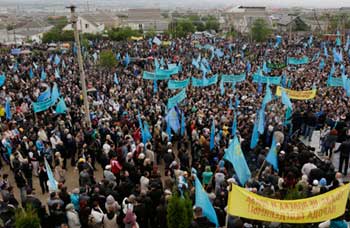

Vol. 78/No. 45 December 15, 2014

|
| AP Photo/Alexander Polegenko |
| Despite ban by Moscow, May 18 rally commemorating 70th anniversary of Stalin’s deportations of Crimean Tatars was held at alternate location near Simferopol, Crimea, above. Moscow-imposed regime has now banned annual Dec. 10 Human Rights Day rally in Crimea. |
“For years we have traditionally conducted mass events, in particular rallies, dedicated to the problems of Crimean Tatar people,” Mejlis representative Nariman Dzhelal told the press in Simferopol Dec. 2. “But things have changed. The authorities made it clear that the Mejlis will not be allowed to hold any mass events Dec. 10 or any other day.”
Russian troops moved on Crimea, which was part of Ukraine, following the Maidan mobilizations that led to the overthrow of Ukrainian President Viktor Yanukovych, an ally of Russian President Vladimir Putin. Authorities have since banned Crimean Tatar protests, exiled Mustafa Dzhemilev, Refat Chubarov and other Mejlis leaders from the peninsula for five years, organized armed raids on Tatar activists’ homes, offices and mosques, shut down Tatar news media and arrested or “disappeared” Tatar militants.
The Crimean Tatars were first subjugated by the invading armies of the Russian empire in 1763. This changed with the 1917 Bolshevik Revolution, which opened the door to Crimean self-determination as part of the voluntary Union of Soviet Socialist Republics. For about a decade, the Tatars’ culture flourished under the Crimeanization policy of the Bolshevik Party led by Vladimir Lenin.
But these gains were reversed as part of a counterrevolution as a growing privileged layer in the government bureaucracy led by Joseph Stalin consolidated control over the Soviet Union and Communist Party. Tatar leaders were among millions arrested or killed by the Stalinist murder machine.
During World War II, Stalin moved to deport the entire Tatar people, branding them wholesale as Nazi collaborators. Packed into boxcars and shipped to Uzbekistan, Siberia and the Urals, nearly half of them died. The Stalinist regime organized to “Russify” Crimea, granting land to new Russian settlers. Few Tatars were able to return to their homeland until after the collapse of the Soviet Union in 1991. Today there are some 270,000 Tatars in Crimea.
“In the past eight months, the de facto authorities in Crimea have limited free expression, restricted peaceful assembly, and intimidated and harassed those who have opposed Russia’s actions,” according to a Nov. 17 Human Rights Watch report. “In particular the authorities have targeted the Crimean Tatar community.”
When Dzhemilev attempted to enter Crimea on May 3, he was met at the border by 5,000 Tatars. Dozens have been victimized on frame-up charges since. A demonstration called by the Mejlis for May 18, the anniversary of the mass deportation of the Tatars, was banned. In response, Crimean Tatars staged a successful rally in a different location.
Under the pretense of looking for “drugs, weapons and prohibited literature,” authorities, accompanied by armed and masked thugs, have ransacked mosques, Islamic schools and dozens of private homes.
Authorities use armed paramilitary groups, the report says, “in enforced disappearances, beatings, and in at least one case, the torture of pro-Ukraine activists” and Tatars.
The New York Times reports that some 4,000 businesses, organizations and agencies have been expropriated by the Moscow-installed regime, including many belonging to Crimean Tatars and members of the Ukrainian and Greek branches of the Orthodox Church.
The Mejlis, “by far the loudest voice against Russian annexation,” the Times said, “was ousted from the building it rents.” The Ukrainian Orthodox Church has had 11 of its 18 parishes shuttered.
Dzhemilev announced at a meeting of SOS Crimea in Kiev Nov. 25 that he is working to launch a news network to reach occupied Crimea. His goal, he said, was to get the truth out, but also to ensure that “the Crimea issue not fall off the pages of the Ukrainian and international press.”
Front page (for this issue) |
Home |
Text-version home